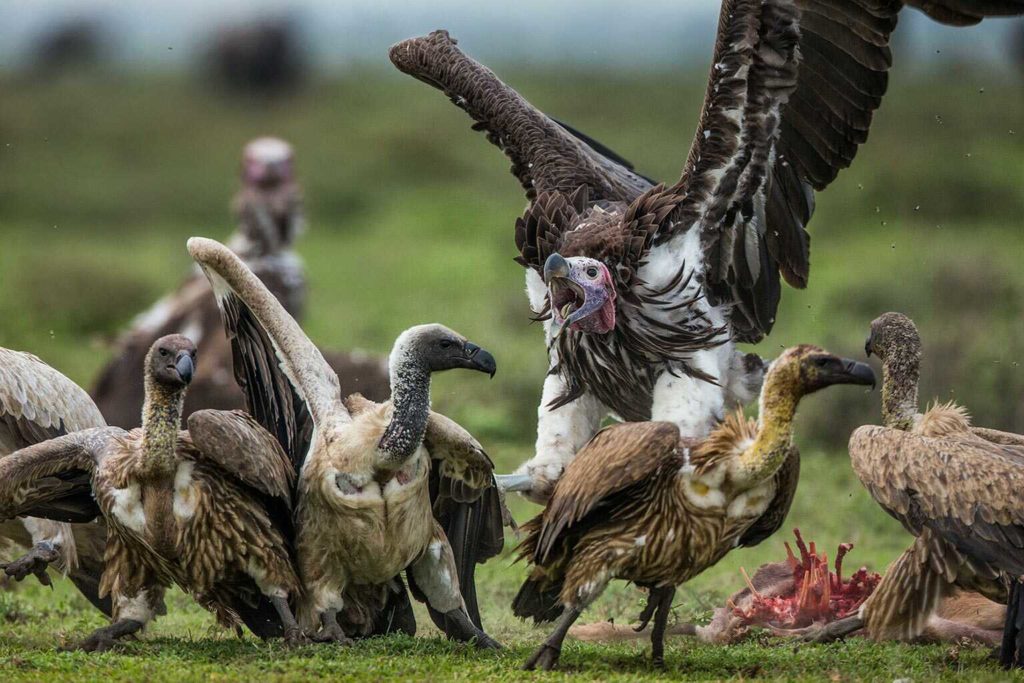Conservation experts on Wednesday, May 8, 2019 at a daylong workshop in Lagos stressed the need to save vultures threatened by extinction, warning that their absence would inflict Nigeria, Africa and humanity with diseases and deaths.

The experts made the call in Lekki, Lagos at an event organised by the Nigerian Conservation Foundation (NCF) and BirdLife International.
The conservation experts and other critical stakeholders took turns to emphasise the need for Nigeria to strengthen its regulations, prosecution and awareness campaigns as the nation had become the largest Illegal Wildlife Trade (IWT) hub in Africa.
The stakeholders at the event supported by the United States Fish and Wildlife Service (USFWS) funded two-year project titled, “Combating the West African Illegal Trade in Threatened Vultures and their parts for Belief-based Use” raised alarm of the lurking danger.
The workshop aimed at combating illegal trade in Nigeria which is a source, transit route and market hotspot for the trade, particularly in the Northern and South-Western states had the Customs and Police representatives.
The workshop focused on how to reduce the impact of the illegal trade on the populations of Critically Endangered Hooded, White-backed, Ruppell’s, White-headed, Lappet-faced and Egyptian Vulture species.
It also discussed how to reduce the use of vulture parts by traditional healers by promoting the use of viable alternative herbs and roots in traditional medicines and called for strengthened law enforcement.
Dr Muktari Aminu-Kano, Director-General of NCF, said that vultures were being “actively harvested” in Nigeria and across Africa for various mystical reasons and that efforts were on by NCF to tackle the menace.
Aminu-Kano said the foundation was carrying out awareness campaign among traditional doctors on herbal alternatives to vultures as well as seeking collaboration of security agencies on enforcement of laws.
“Vultures are very important, they are our unpaid sanitary inspectors, some people call them garbage collectors but they are beyond just collectors, they are like PSP, treatment plant and landfill all rolled into one because they actually clean up the environment and prevent us from having nasty diseases.
“They prevent the proliferation of pests because they eat up carcasses. If vultures go extinct then we must use very effective and efficient garbage disposal system.
“And by doing that, it means that there will be diseases, there will be deaths, there will be revenue loss to the country and also we will deprive future generations of knowing that vultures ever existed,” he said.
He cited India as example of a country that had upsurge of diseases like plagues and rabies when their vulture population was depleted by 90 per cent.
Also, Dr Joseph Onoja, NFC’s Technical Director, while making a presentation identified hotspots for the trade in vultures in Nigeria to include Osun, Oyo, Ogun in the south-west and Kano, Sokoto and Katsina in the north.
Onoja explained that vultures were used for ritual rites to cure madness and evil omen, while its eggs were used for money making rituals and some people consume the meat as food.
The Deputy Head of Mission, British Deputy High Commission, Lagos, Mr Peter Thomas, while delivering his speech said that the U.K. has been at the forefront of eradicating IWT which has become the highest criminal revenue spinner after drugs.
“The IWT continues to be a global problem, involving serious organised crime networks and work worth up to 17 billion pounds per year. That is more than 75 countries’ Gross Domestic Product (GDP).
“If that figure alone is not shocking in itself, if estimates for illegal logging and fishing are included, the figure goes up to 114 billion pounds. And that is more than 130 countries’ GDP,” he said.
Thomas lauded the commitment of Nigeria through its Minister of State for Environment, Alhaji Ibrahim Idris, at the 2018 London IWT Conference to reach a cross-border conservation agreement with Cameroon and join the Elephant Protection Initiative.
Also, Vulture Conservation Manager, BirdLife International, Beckie Garnett, said that efforts were on targeting Nigeria to reduce IWT and trade in vultures and its parts by 20 per cent by year 2020.
Experts, customs representatives, police, state and Federal Ministry of Environment officials, hunters and traditional healers, took turns to proffer solutions to bridging ignorance gap on vultures, eliminating demand chain and protection of other endangered species.
Some celebrities in the entertainment industry who were unveiled as Vulture Ambassadors at the event promised to spread the awareness on vultures’ protection.
The celebrity Vulture Ambassadors are Tito DA Fire, Seyi Asurf, Yomi Fash-Lanso, Shehu Kano and Tope Alake.
